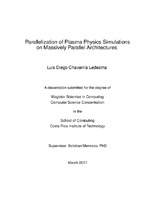Parallelization of Plasma Physics Simulations on Massively Parallel Architectures
Abstract
Clean energy sources have increased its importance in the last few years. Because of that,
the seek for more sustainable sources has been increased too. This effect made to turn the
eyes of the scientific community into plasma physics, specially to the controlled fusion. This
plasma physics developments have to rely on computer simulation processes before start the
implementation of the respective fusion devices. The simulation process has to be done in order
to detect any kind of issues on the theoretical model of the device, saving time and money. To
achieve this, those computer simulation processes have to finish in a timely manner. If not, the
simulation defeats its purpose. However, in recent years, computer systems have passed from
an increment speed approach to a increment parallelism approach. That change represents a
short stop for these applications. Because of these reasons, on this dissertation we took one
plasma physics application for simulation and sped it up by implementing vectorization, shared,
and distributed memory programming in a hybrid model. We ran several experiments regarding
the performance improvement and the scaling of the new implementation of the application
on sumpercomputers using a recent architecture, Intel Xeon Phi - Knights Landing - manycore
processor. The claim of this thesis is that a plasma physics application can be parallelized
achieving around 0.8 of performance under the right configuration and the right architecture.
Description
Proyecto de Graduación (Maestría en Computación) Instituto Tecnológico de Costa Rica, Escuela de Ingeniería en Computación, 2017.
Share
Metrics
Collections
- Maestría en Computación [113]


